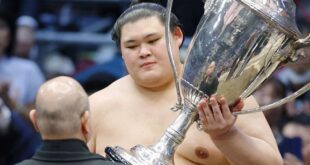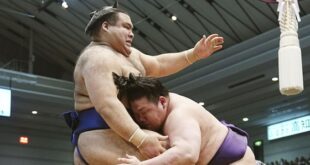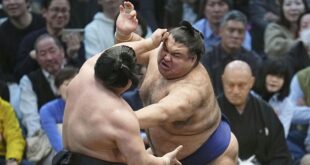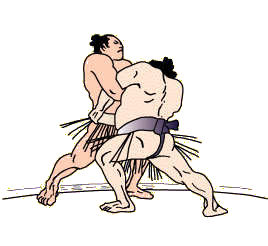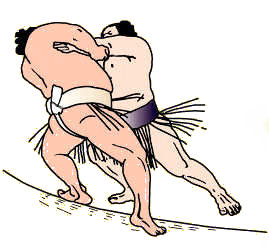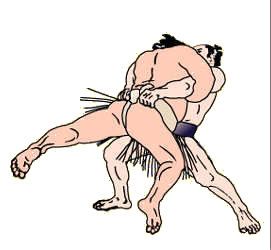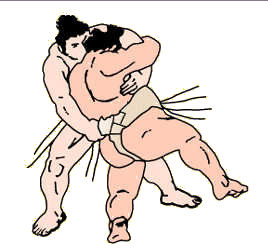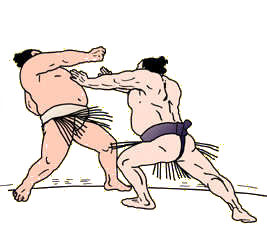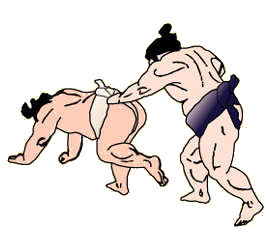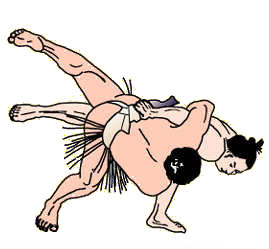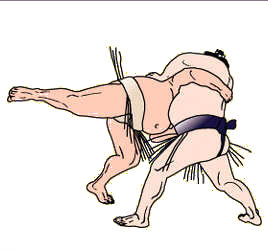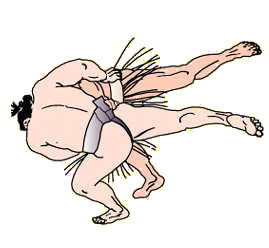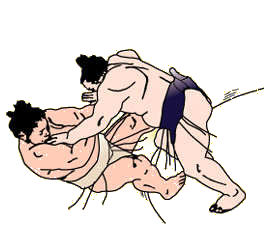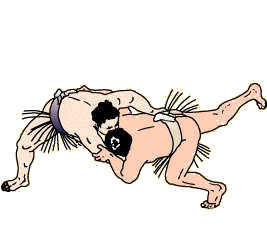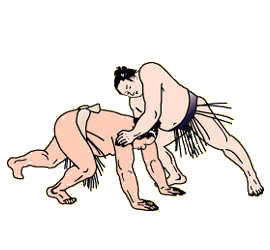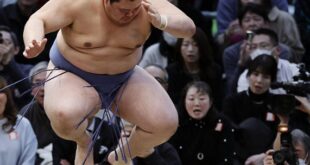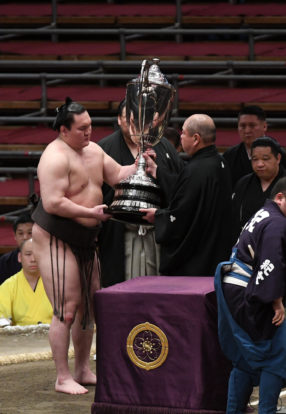
Jour final : Et à la fin, c’est un yokozuna qui gagne !
Cette dernière journée de combat s’est achevée comme elle a commencé : dans une salle vide de spectateurs. Pourtant, rien n’était joué pour savoir qui serait le vainqueur de la Coupe de l’Empereur : les deux yokozuna en lice avaient chacun fait un tournoi exemplaire où ils avaient prouvé plusieurs fois leur valeur en rebondissant après des défaites. Mais aujourd’hui, c’était le combat couperet, le dernier effort avant de savoir quel serait le meilleur rikishi du tournoi d’Osaka
La nervosité était de mise pour le dernier combat de la journée et du Haru bashô, et Hakuhô fit un faux-départ, peut-être aussi histoire de jauger les capacités de réaction de son adversaire et choisir sa stratégie d’attaque. Dès le tachi-ai, les choses s’équilibrèrent : recherche de la prise au mawashi pour les deux lutteurs, Hakuhô réussissant même à passer son bras gauche sous l’épaule de Kakuryû pour une meilleure prise en main. Un équilibre précaire suivit, rapidement coupé par une attaque de Kakuryû essayant lui aussi de bloquer le bras adverse en passant par-dessus. Malheureusement, cette attaque fragilisa son équilibre et Hakuhô en profita pour pousser son opposant jusqu’à ce qu’il atteigne le bord du dohyô et se fasse sortir.
13ème victoire pour le yokozuna Hakuhô, et 44ème yushô lui rapportant une fois de plus la coupe de l’Empereur. Après le combat, il est revenu sur les conditions du tournoi :
« Le tout premier jour, c’était vraiment étrange et il était vraiment difficile de maintenir ma motivation. Il y a eu beaucoup de hauts et de bas, mais ce n’était pas seulement moi. Tout le monde ressentait la même chose. »
« J’ai pu ensuite retrouver le calme et je pense que j’ai pu bouger très agilement », a-t-il aussi déclaré. « Vivre un tournoi de ce genre n’est pas seulement une très bonne expérience pour ma carrière de sumo, mais pour ma vie dans son ensemble.«
Parmi les bons résultats, le sekiwake Asanoyama poursuit sa route vers une nomination au grade d’ôzeki avec une victoire contre le seul ôzeki du tournoi, Takakeishô, qui lui échoue à obtenir le kachi-koshi et sera donc kadoban au prochain tournoi, avec obligation d’atteindre les 8 victoires, sous peine de perdre son rang.
Le deuxième sekiwake Shodai a perdu son dernier combat contre le maegashira 9 Takanosho, mais il avait lui déjà atteint son kachi-koshi. Takanosho, avec 12 victoires, obtient le prix du meilleur esprit combatif (Kantô-shô).
Autre lutteur récompensé, le maegashira 5 Onosho remporte le prix de la performance exceptionnelle (Shukun-shô) avec sa victoire contre Hakuhô le dixième jour. Il finit sur un bon combat en battant Mitakeumi (M3).
Enfin, le bulgare Aoiyama a lui été récompensé du prix de la technique (Ginô-shô). Pourtant, sa défaite hier contre Hakuhô lui avait donné un coup au moral, et on sentait bien que la motivation faisait défaut lors de sa rencontre aujourd’hui contre le poids léger Ishiura, qu’il a perdu sans conteste.
Les lutteurs kachi koshi du jour sont :
Jûryô : Chiyoshoma, Kotoyuki
Les lutteurs make koshi du jour sont :
Jûryô : Chiyonoumi
Clic on the title bellow for article in English :
Hakuho outlasts Kakuryu to win 44th Emperor's Cup
OSAKA – Hakuho seized a record-extending 44th top-level championship Sunday after outlasting fellow yokozuna Kakuryu at the Spring Grand Sumo Tournament.
The two Mongolian-born titans came into Day 15 tied for the lead at 12-2, setting up a tantalizing winner-take-all battle in the final bout of the meet at Edion Arena Osaka. Following a false start from Hakuho, Kakuryu gained an early advantage thanks to a shallow belt grip, but the all-time great countered with a belt grip of his own. After repositioning his feet, Hakuho muscled his opponent over the straw for a frontal force-out that denied Kakuryu (12-3) a seventh Emperor’s Cup.
Though it provided drama inside the ring, the 15-day tournament will be remembered as the first in the history of sumo to be held in an empty arena after spectators were locked out due to the coronavirus pandemic.
“On the very first day, I felt really strange, and it was really difficult to maintain motivation,” Hakuho said. “There were a lot of ups and downs, but it was not just me. Everybody felt the same way.”
Visibly exhausted after winning the longest bout of the day, the 35-year-old credited his mental strength for helping him secure victory after Kakuryu had taken the upper hand.
“I was able to regain calmness and I think I was able to move very nimbly,” said Hakuho, who took Japanese citizenship last year. “To undergo such an unprecedented tournament is not just a very good experience for my sumo career, but my life as a whole.”
In the penultimate bout, ozeki Takekeisho battled sekiwake Asanoyoma with a winning record and promotion on the line, respectively. Takakeisho (7-8) opened with a powerful drive that forced Asanoyama (11-4) to the edge, but the sekiwake grabbed a belt grip that gave him the momentum for a push-down victory. Takakeisho must now contest the next tournament as a demotion-threatened kadoban ozeki, while Asanoyama is on track for promotion following a recommendation by the Japan Sumo Association’s judges division.
No. 9 maegashira Takanosho (12-3) capped off an excellent 15 days by pushing down sekiwake Shodai (8-7). The 25-year-old, who won his first Fighting Spirit Prize, will go into the next meet with his highest-ever ranking.
Komusubi Endo fell to No. 7 Takarafuji (9-6) by push out, ending with a 7-8 losing record that will see him drop out of the three sanyaku ranks below yokozuna.
Komusubi Hokutofuji will also start the next meet back among the rank and file after a 4-11 finish. The Saitama native was forced out by No. 8 Shohozan (4-11).
A day after relinquishing his share of the lead, No. 13 maegashira Aoiyama took home the Technique Prize for an impressive 11-4 tournament in which he made a surprise tilt at the title.
“I hadn’t even though about (the championship) until halfway through the tournament, and at that point I realized I was a marked man, which made me nervous,” said the 33-year-old from Bulgaria, who lost his final-day bout to No. 12 Ishiura (9-6).
The Outstanding Performance Prize winner, No. 5 Onosho, finished at 9-6 after beating No. 3 Mitakeumi (10-5). Onosho, a 23-year-old former komusubi who earned a kinboshi prize for beating Hakuho on Day 10, said he did not expect to be recognized as a top performer.
“I just did what I was supposed to do. I am very happy (with the prize), as it was unexpected,” Onosho said. “I’ve been trying a lot of things, which might finally be bearing fruit.”
No. 2 Okinoumi finished at 8-7 after beating No. 13 maegashira and former ozeki Kotoshogiku (7-8) in a battle of rank-and-file grapplers with seven wins.
No. 6 Kagayaki improved to 8-7 after beating No. 17 Meisei (7-8), while No. 3 Yutakayama (8-7) also picked up a vital eighth win against No. 15 Chiyomaru (7-6-2).
Source : The Mainichi

Champions par division :
Makuuchi : Hakuho (13-2)
Yokozuna – Miyagino beya
Jûryô : Kotoshoho (12-3)
Est 6 – Sadogatake beya
Makushita : Nishikifuji (7-0)
Est 49 – Isegahama beya
Sandanme : Ura (7-0)
Ouest 30 – Kise beya
Jonidan : Dewanoryu (7-0)
Est 49 – Dewanoumi beya
Jonokuchi : Shinohara (7-0)
Ouest 22 – Fujishima beya
Prix spéciaux (sanshô) :
Shukun-shô : Onosho (1er)
Performance exceptionnelle
Kantô-shô : Takanosho (1er)
Meilleur esprit combatif
Ginô-shô : Aoiyama (1er)
Prix de la technique
- Parution du banzuke : 27 Avril
- Début du tournoi : 10 Mai
- Fin du tournoi : 24 Mai
Lieu : Tokyo (Ryogokû Kokugikan)
Merci à tous d’avoir suivi le tournoi jour après jour sur Dosukoi mais l’actualité du sumo continue même en dehors des basho. Toutes les informations des événements à venir sont sur notre site. N’oubliez pas de nous rejoindre sur les réseaux sociaux, suivez-nous sur Facebook et Twitter et abonnez-vous à notre chaîne YouTube. N’hésitez pas à partager les articles sur ces réseaux et à les commenter.
Enfin, merci à Kintamayama ainsi qu’à Natto sumo (Sumo Natto) pour leurs vidéos quotidiennes ainsi qu’à tous nos lecteurs.
- Makuuchi
- Juryô
|
Rikishis
|
Score
|
Kimarites
|
Score
|
Rikishis
|
 Ishiura
石浦 (Maegashira 12) |
|
|
|
|
 Aoiyama
碧山 (Maegashira 13) |
|
 Daiamami
大奄美 (Maegashira 17) |
|
|
|
|
 Terutsuyoshi
照強 (Maegashira 11) |
|
 |
|
|
|
|
 Shimanoumi
志摩ノ海 (Maegashira 16) |
|
 Sadanoumi
佐田の海 (Maegashira 10) |
|
|
|
|
 Nishikigi
錦木 (Maegashira 14) |
|
 Kotonowaka
琴ノ若 (Maegashira 18) |
|
|
|
|
 Tochinoshin
栃ノ心 (Maegashira 9) |
|
 Meisei
明生 (Maegashira 17) |
|
|
|
|
 Kagayaki
輝 (Maegashira 6) |
|
 Myogiryu
妙義龍 (Maegashira 6) |
|
|
|
|
 Tochiôzan
栃煌山 (Maegashira 10) |
|
 Ryuden
竜電 (Maegashira 5) |
|
|
|
|
 Azumaryu
東龍 (Maegashira 16) |
|
 Kaisei
魁聖 (Maegashira 14) |
|
|
|
|
 Abi
阿炎 (Maegashira 4) |
|
 Enho
炎鵬 (Maegashira 4) |
|
|
|
|
 Ikioi
勢 (Maegashira 12) |
|
 Onosho
阿武咲 (Maegashira 5) |
|
|
|
|
 |
|
 Yutakayama
豊山 (Maegashira 3) |
|
|
|
|
 Chiyomaru
千代丸 (Maegashira 15) |
|
 Tamawashi
玉鷲 (Maegashira 7) |
|
|
|
|
 Tokushoryu
徳勝龍 (Maegashira 2) |
|
 Okinoumi
隠岐の海 (Maegashira 2) |
|
|
|
|
 Kotoshôgiku
琴奨菊 (Maegashira 13) |
|
 Daieisho
大栄翔 (Maegashira 1) |
|
|
|
|
 Kiribayama
貴ノ富士 (Maegashira 8) |
|
 Takarafuji
宝富士 (Maegashira 7) |
|
|
|
|
 Endo
遠藤 (Komusubi) |
|
 |
|
|
|
|
 Shôhôzan
松鳳山 (Maegashira 8) |
|
 Takanosho
隆の勝 (Maegashira 9) |
|
|
|
|
 Shodai
正代 (Sekiwake) |
|
 |
|
|
|
|
 Asanoyama
朝乃山 (Sekiwake) |
|
 |
|
|
|
|
 |
|
Rikishis
|
Score
|
Kimarites
|
Score
|
Rikishis
|
 Chiyonoo
千代ノ皇 (Makushita 4) |
|
|
|
|
 Takagenji
貴源治 (Juryo 10) |
|
 Midorifuji
翠富士 (Juryo 11) |
|
|
|
|
 Churanoumi
美ノ海 (Juryo 7) |
|
 Mitoryu
水戸龍 (Juryo 7) |
|
|
|
|
 Kizakiumi
木崎海 (Juryo 9) |
|
 Kotoshoho
琴勝峰 (Juryo 6) |
|
|
|
|
 Chiyonoumi
千代の海 (Juryo 13) |
|
 Akiseyama
明瀬山 (Juryo 14) |
|
|
|
|
 Kyokushuho
旭秀鵬 (Juryo 5) |
|
 Kotoeko
琴恵光 (Juryo 5) |
|
|
|
|
 Hakuyozan
白鷹山 (Juryo 12) |
|
 Akua
天空海 (Juryo 6) |
|
|
|
|
 Daishomaru
大翔丸 (Juryo 4) |
|
 Tobizaru
翔猿 (Juryo 4) |
|
|
|
|
 Ichinojo
逸ノ城 (Juryo 8) |
|
 Asagyokusei
朝玉勢 (Juryo 12) |
|
|
|
|
 Daishoho
大翔鵬 (Juryo 3) |
|
 Terunofuji
照ノ富士 (Juryo 3) |
|
|
|
|
 Chiyootori
千代鳳 (Juryo 14) |
|
 Kyokutaisei
旭大星 (Juryo 8) |
|
|
|
|
 Wakatakakage
若隆景 (Juryo 2) |
|
 Chiyoshoma
千代翔馬 (Juryo 2) |
|
|
|
|
 Wakamotoharu
(Juryo 11) |
|
 Yago
矢後 (Juryo 10) |
|
|
|
|
 Hidenoumi
英乃海 (Juryo 1) |
|
 Kotoyuki
琴勇輝 (Juryo 1) |
|
|
Fusen
|
|
|
 Hoshoryu
遠藤 (Juryo 9) |
 Dosukoi, le site du sumo Sumo : actualités, résultats, dossiers, vidéos… toute la passion du sumo est sur Dosukoi!
Dosukoi, le site du sumo Sumo : actualités, résultats, dossiers, vidéos… toute la passion du sumo est sur Dosukoi!
